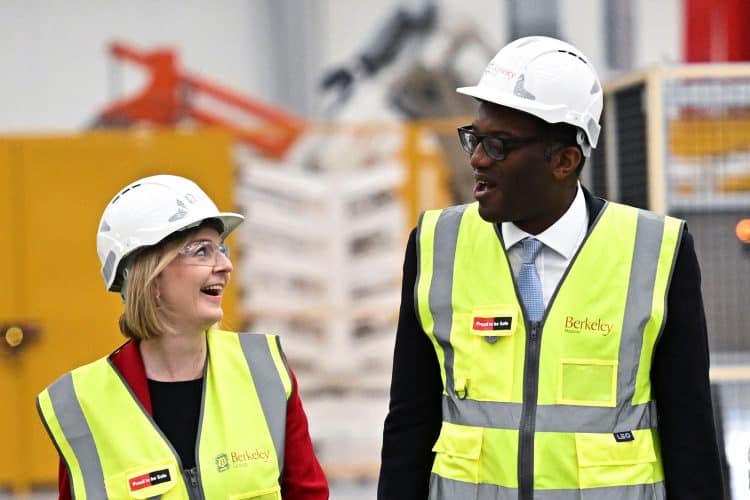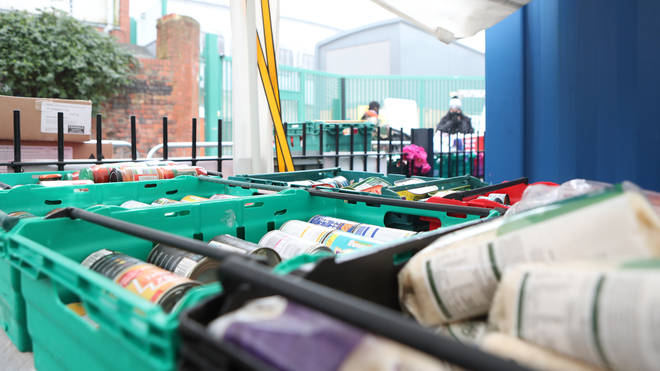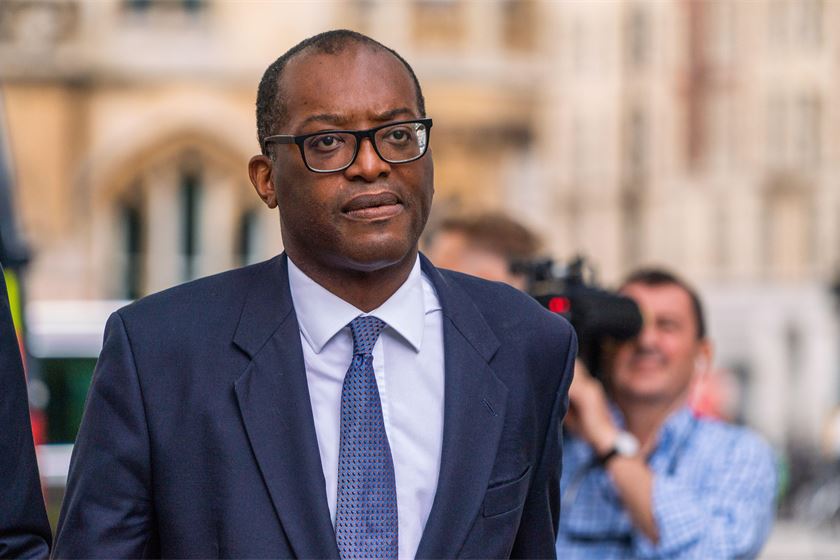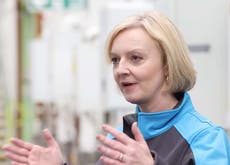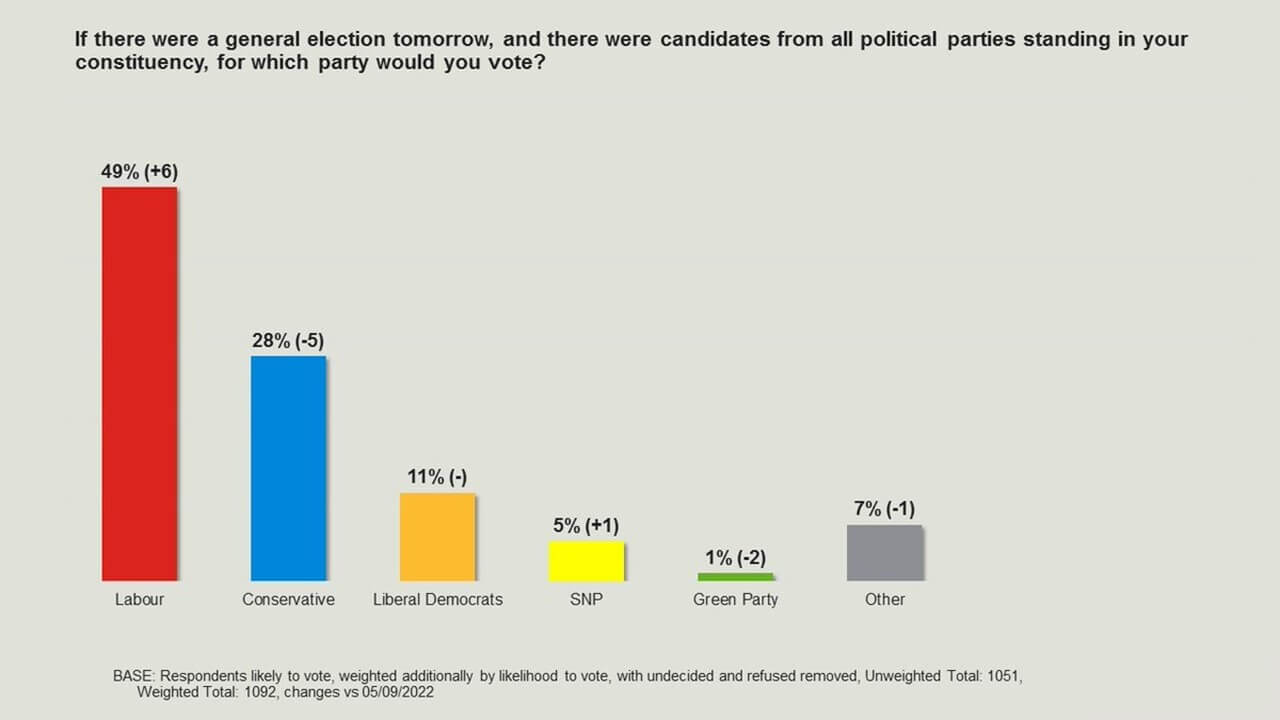Truss Should Resign as UK Prime Minister, More Than Half of Britons Say

Fri, September 30, 2022
(Bloomberg) --
More than half of Britons think Liz Truss should quit as UK premier, according to a YouGov poll that adds to her woes less than a month into the job.
The survey on Friday underscores the damage done to Truss’s standing and that of her Conservative Party by the huge package of unfunded tax cuts her government unveiled a week ago, triggering a selloff in the pound and government bonds and leaving her party trailing the opposition Labour by a record distance.
Some 51% of almost 5,000 Britons surveyed said the prime minister should quit, with 54% saying Chancellor of the Exchequer Kwasi Kwarteng should resign.
Even in the face of a backlash from markets, Tory Members of Parliament and the electorate, Truss and Kwarteng so far have stood firm behind their fiscal package -- which benefitted the wealthiest more than lower earners -- insisting they’ll come forward with a medium-term plan for the economy and a set of independent economic forecasts on Nov. 23.
The beleaguered prime minister now heads into her Conservative Party’s annual conference on Sunday with the challenge of restoring her standing among her MPs and persuading the financial markets that the Tories still stand for the responsible management of the economy.
The YouGov poll also showed Truss is hemorrhaging support among those who voted Conservative in the last general election in 2019. Some 36% of Tory voters said Truss should go and 41% called for Kwarteng’s departure.
The latest survey piles the misery on the Tories after a YouGov poll of voting intentions on Thursday gave Labour a record 33-point lead.
UK's Labour has 33-pt lead over ruling Conservatives -YouGov poll

Britain's Labour Party annual conference in Liverpool
Thu, September 29, 2022
LONDON (Reuters) -Britain's opposition Labour party has surged to a 33-point lead over the ruling Conservatives, according to a YouGov poll on Thursday, after days of chaos in financial markets triggered by the government's planned tax cuts.
The lead was a record high share for Labour in any YouGov poll as well as the highest figure the party has ever recorded in any published survey since the late 1990s, YouGov said.
Earlier on Thursday, British Prime Minister Liz Truss defended her controversial plan to reignite economic growth after huge tax cuts unveiled last week hammered the value of the pound and government bond prices.
The YouGov poll of voting intention conducted over Wednesday and Thursday showed 54% support for Labour and 21% for the Conservatives. It was a survey of more than 1,700 British adults.
Another YouGov poll earlier this week had shown 45% of voters backing Labour compared to 28% support for the Conservatives.
Truss took office on Sept. 6 after defeating former finance minister Rishi Sunak to win the Conservative Party's leadership contest. The next national election is likely to be held in 2024.
At least two Conservative lawmakers - both of whom had backed Sunak during the party leadership race - publicly criticised Truss's economic plans following the release of the poll.
"This is now a serious crisis with a lot at stake," Conservative lawmaker George Freeman said on Twitter. "The economic package of borrowing & tax cuts announced last week clearly can't command market or voter confidence."
Another lawmaker from Truss's party, Julian Smith, urged the government to reverse the abolition of the 45% top rate of income tax.
Three other polls on Thursday also showed large leads for Labour - Survation put Labour's lead over the Conservatives at 21 points; Deltapoll showed Labour 19 points ahead; and Redfield & Wilton Strategies had Labour 17 points ahead.
Opposition leader Keir Starmer said during his party's annual conference this week that it was Labour's best chance to win power since 2010, following four straight election defeats.
(Reporting by Sachin Ravikumar; editing by Michael Holden, Kirsten Donovan)
Nick Gutteridge
Fri, September 30, 2022

Rishi Sunak and Liz Truss - Dan Kitwood/Getty Images Europe
Conservative voters think Rishi Sunak would have made a better prime minister than Liz Truss, new polling for The Telegraph reveals.
The survey, on the eve of the Tory conference in Birmingham, shows just a third of those who backed the party in 2019 think she is a good leader.
Over half think she has made a bad incumbent in No 10 - almost as high as the number who would say the same about Sir Keir Starmer.
The results will lead to further soul-searching within the party about the decision by members to elect Ms Truss rather than the former chancellor.
Tory MPs in a mutinous mood over the fallout from the mini-Budget have discussed returning to a system where they pick the leader in future.
It has also emerged some rebel Conservatives are in talks with Labour over voting down her economic plan, especially the abolition of the 45p income tax rate.
After a dramatic week, Labour now holds a colossal lead on nine key criteria, including who the public trust more to manage the economy.
Amongst those who voted Conservative at the last election, a mere 34 per cent said they thought Ms Truss made a good Prime Minister.
That compares with 60 per cent for Boris Johnson, her predecessor, and 45 per cent for Mr Sunak, who she vanquished in the leadership race.
She fares even worse among the wider public, with only one in five thinking she is a good leader and 63 per cent calling her a bad one.
Sir Keir has positive rating
Mr Johnson and Mr Sunak both fare better with the electorate, scoring 31 per cent each, but by far the most choice is Sir Keir on 46 per cent.
The Labour leader is the only one with a positive net rating scoring +14, while Mr Sunak is on -21, Mr Johnson on -31 and Ms Truss on -43.
In a dire set of results for the Tories, the study shows how their reputation for competence has been shredded over the last 21 months.
The poll by JL Partners asked voters to rate the two main parties on nine key areas including the economy, NHS, and social equality.
It reveals in January 2020 the Conservatives held a commanding 22-point lead in terms of who the public thought was “best for the economy”.
That had halved to nine per cent by January of this year and has now been overhauled, with Labour sitting a comfortable 13 points ahead.
It is a similar story on who voters see as “competent and capable”, with the Tories slumping from a 20 per cent advantage to trailing by 13 points.
The Conservatives held a 15-point lead on which party would “move the country in the right direction” and are now 16 per cent behind Labour.
When it comes to who is “best for protecting and creating jobs” they have also plummeted from four per cent ahead to 19 points in arrears.
Meanwhile Sir Keir has widened the gap on who most shares voters’ values, is best for the NHS and will “stand up for people like me”.
In contrast, the number of people who see the Tories as “out of touch” has tripled to 37 points ahead since the start of 2020.
Back then Mr Johnson had just won a huge majority while Labour, led by Jeremy Corbyn, was seen as the most divided party by a 46-point margin.
But by January of this year the tables had reversed entirely, with the fallout from partygate seeing the Conservatives surge to a 21 per cent lead.
Electability ‘lost overnight’
The impression of the Tories as fractured has only grown since the ousting of the former prime minister and now stands at 27 per cent ahead.
James Johnson, who ran polling in Theresa May’s Number 10, said: “The drastic changes we are seeing in the fortunes of the Conservatives can be explained by this Telegraph poll.
“Labour now has a double-digit advantage on the economy, the first time it has led on this measure in this Parliament.
“And, since last month, the blame for economic woes has pivoted away from Russia and onto the Government itself.
“When the Conservatives lose their edge on the economy, they lose their electability overnight - and all signs are that we have seen exactly such a shift in the last few days.”
Half of voters want Truss to resign
Separate polling by the firm YouGov published on Friday afternoon painted an equally bleak picture for Ms Truss ahead of the conference.
It showed 51 per cent of Britons think the Prime Minister should resign, including 36 per cent of those who voted Conservative at the last election.
A third survey released by Stonehaven revealed Labour is now on course to win an outright majority at the next election.
The MRP poll - the same kind which correctly predicted the 2019 result - puts Sir Keir’s party on 332 seats and the Tories on 228.
Pandora Lefroy, the insight director at Stonehaven, said: “It has been a turbulent year for the Conservative party and that is being reflected in our election modelling which is showing, for the first time in 18 months, Labour having a path to an outright majority.
“A lot can change between now and the next General Election, but today we are seeing Red Wall voters are going back to their roots.
“Interestingly our data shows it is not their values that have changed, it’s simply that Labour is now seen as the party that best represents those values.”
Mini-budget not ‘executed competently’
Ms Truss faced a further backlash from angry Tory MPs on Friday with one grandee saying she has already lost the party at the next election.
Sir Charles Walker, a veteran backbencher, warned the Prime Minister she will face a “difficult time” getting the mini-Budget through Parliament.
He accused her and the Chancellor of “naivety” and “hubris” over the way it was announced, suggesting it was not “executed competently”.
“I don’t think I’ll be voting for these measures per se,” he told Times Radio when asked whether he was ready to rebel.
“I think the Government has learnt its lesson and will be amending them and doing some more thinking. If it doesn’t, it’s going to have a difficult time.”
Sir Charles warned that regardless the Tories have suffered a “cliff-edge collapse” and must start thinking about how to leave “some form of legacy” to Labour.
“I think it’s hard to construct an argument now that the Conservatives can win that general election. I suspect the conversation is how much do we lose it by?” he said.
Steve Double, a former environment minister, said he “can’t explain” the decision to axe the 45p tax rate to his constituents and Ms Truss “should reverse” it.
“At this particular moment, when so many households are facing huge pressures on their finances in the coming months…quite frankly I think it's a mistake,” he told BBC Cornwall.
The MP for St Austell said he won’t be attending this year’s conference, adding that he has “never known the party to be as divided as it is right now”.
The Prime Minister has warned the country faces a “difficult winter” ahead.
George McMillan
PUBLISHED Saturday 01 October 2022 -
Liz Truss has admitted Chancellor Kwasi Kwarteng’s mini-budget caused “disruption” but insisted they were right to act to get the economy moving and to protect families from soaring energy bills.
As Tories prepared to head to Birmingham for their annual conference, the Prime Minister warned the country faced a “difficult winter” ahead as she indicated she had no plans to reverse her tax-cutting agenda.
“I recognise there has been disruption but it was really, really important we were able to get help to families as soon as possible,” she said in a pooled interview with broadcasters on Friday.
“This is going to be a difficult winter and I am determined to do all I can to help families and help the economy at this time.”
Her comments came at the end of a tumultuous week which saw the pound slump to an all-time low against the dollar and the Bank of England forced to spend billions buying up government debt to prevent a collapse of the pensions industry.
The sell-off of sterling prompted fears that millions of mortgage holders could face crippling rises in their repayments as the Bank moves to ratchet up interest rates to shore up the currency and put a lid on inflation.

Prime Minister Liz Truss during a visit to the British Gas training academy Ian Vogler/Daily Mirror

The Chancellor insisted he will produce a “credible plan” to get the public finances back on track with a “commitment to spending discipline”. Owen Humphreys
The Chancellor insisted he will produce a “credible plan” to get the public finances back on track with a “commitment to spending discipline”.
“The British taxpayer expects their Government to work as efficiently and effectively as possible, and we will deliver on that expectation,” he said.
“Not all the measures we announced last week will be universally popular. But we had to do something different. We had no other choice.”
The turmoil erupted after markets took fright at Mr Kwarteng’s £45 billion package of unfunded tax cuts – the biggest in 50 years – while committing billions to capping energy bills for the next two years.
With the Tories tanking in the opinion polls – one showed Labour opening up a hitherto unthinkable 33-point lead – some Conservative MPs have been pressing for a change of course.
Despite having been in Downing Street for less than a month, some have questioned whether Ms Truss can now survive to the end of the year as the party has seen its reputation on the economy shredded.
The Prime Minister, however, insisted that Mr Kwarteng was right to cut taxes as part of their plan to drive up the UK’s sluggish rate of economic growth.
“What is important to me is that we get Britain’s economy back on track, that we keep taxes low, that we encourage investment into our country and that we get through these difficult times,” she said.
With some analysts warning of a squeeze on public spending to get debt under control, the Prime Minister again refused to commit to the annual uprating of benefits in line with inflation – something Rishi Sunak had promised to do when he was chancellor.
Pressed in her interview, Ms Truss said only that it was “something the Work and Pensions Secretary (Chloe Smith) is looking at”.
She added: “What is important to me is that we are fair in the decisions we make, but most importantly that we help families and businesses at this very difficult time with their energy prices.”
A key ally of the Prime Minister, Levelling Up Secretary Simon Clarke, however, went further suggesting the Government was looking to shrink the overall size of the state.
“I think it is important that we look at a state which is extremely large, and look at how we can make sure that it is in full alignment with a lower tax economy,” he told The Times.
Mr Kwarteng is due to publish a medium-term fiscal plan setting out how he intends to get debt falling as a proportion of GDP alongside an updated set of economic forecasts from the Office for Budget Responsibility (OBR) on November 23.
The absence of new projections from the independent OBR was seen as one of the key reasons why the markets reacted so badly to the Chancellor’s mini-budget.

Ian Vogler/Daily Mirror
Some Tory MPs have been pressing him to bring forward the date of publication so as to restore market confidence in the Government.
After a highly unusual meeting on Friday with both the Prime Minister and the Chancellor, the head of the OBR, Richard Hughes, confirmed they would deliver their preliminary forecasts to the Treasury at the end of next week.
However, Mr Kwarteng has made clear that he wants to stick to the November 23 date to allow ministers to set out a series of supply side reforms to support the growth plan.

Liz Truss can go from zero to hero if she holds her nerve, says Mark Dolan
They include changes to the financial sector regulations, immigration and the planning rules, with Mr Clarke hinting they could include changes to the green belt.
“The fact the green belt is larger today than it was when Margaret Thatcher came to power is an extraordinary state of affairs,” he said.
“We need to look at a planning system where we make sensible adjustments which don’t threaten communities and most fundamentally are about going with popular consent, and actually creating incentives that allow local areas to back growth.”
